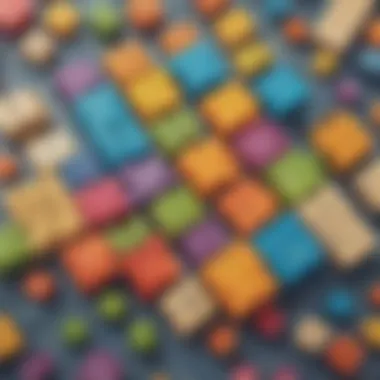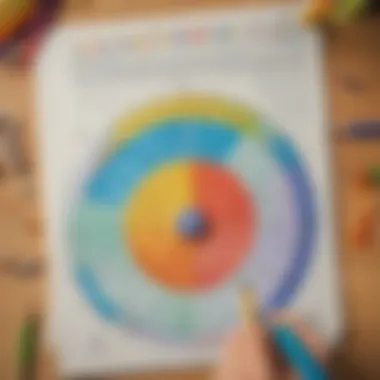Unlocking the Wonders of Math Learning Games for Children


Fun Activities Ideas
When it comes to engaging children in math learning games, incorporating fun activities can greatly enhance their learning experience. Indoor activities, such as board games that require strategic thinking and problem-solving, can help kids develop their math and logic skills in an enjoyable manner. Moving outdoors, various adventurous activities like scavenger hunts or nature trails not only make learning interactive but also encourage kids to apply math concepts in real-life scenarios. Additionally, engaging in arts and crafts projects provides children with the opportunity to explore geometry through shapes and patterns, strengthening their understanding of mathematical concepts.
Educational Games
Educational games serve as powerful tools for teaching children essential skills while keeping them entertained. Math and logic games not only enhance numerical abilities but also promote critical thinking and logical reasoning. Similarly, language and vocabulary games help improve communication skills and expand children's word knowledge. Introducing STEM activities, which integrate science, technology, engineering, and mathematics, can spark curiosity and creativity in young learners, fostering a holistic approach to learning. History and geography puzzles immerse children in a world of discovery, encouraging them to explore different cultures and historical events. Interactive learning apps offer a blend of entertainment and education, allowing kids to engage with various subjects in a dynamic and interactive manner.
Seasonal and Holiday Activities
Seasonal and holiday-themed activities provide unique opportunities to incorporate math learning in festive ways. From Valentine's Day crafts involving geometric shapes to Halloween costume ideas that require measurement and estimation, these activities make math exciting and relevant. Thanksgiving cooking projects not only teach children about fractions and measurements but also instill the value of food preparation and sharing. Engaging in Christmas decorations allows kids to apply spatial reasoning and symmetry while expressing their creativity. Moreover, setting New Year's resolutions tailored for kids can include math-based goals, promoting self-improvement and setting achievable targets.
Parenting Tips and Resources
Ensuring children's learning and development involves implementing effective parenting tips and utilizing available resources. Encouraging creativity in children nurtures innovation and problem-solving skills essential for future success. Setting up a playful learning environment at home creates a conducive space for exploration and learning through play. Maintaining a balance between screen time and playtime enables children to engage in diverse activities while avoiding overexposure to screens. Building strong family bonds through interactive activities fosters a supportive and nurturing environment for children to thrive. Motivating kids to stay active physically and mentally promotes overall well-being and instills healthy habits for life.
Fun Facts and Trivia
Enriching children's knowledge with fun facts and trivia adds an element of excitement to their learning journey. Exploring the animal kingdom unveils fascinating facts about different species, fostering a sense of curiosity and appreciation for nature. Delving into stories of famous inventions provides insights into scientific and technological advancements throughout history. Learning about historical events tailored for kids offers a glimpse into the past, helping children understand the significance of key milestones. Discovering mythical creatures sparks imagination and creativity, transporting kids to mythical realms of wonder. Embarking on space adventures and discoveries ignites a passion for exploration and discovery, inspiring young minds to reach for the stars.
Introduction to Math Learning Games
Math learning games for kids play a crucial role in their educational journey, offering a unique approach to mastering mathematical concepts. These games are designed to make learning enjoyable and interactive, combining fun with essential skills development. By incorporating math games into children's learning routines, parents, teachers, and guardians can enhance not only their mathematical abilities but also their overall cognitive skills. Understanding the significance of math learning games lays the foundation for a comprehensive exploration of their benefits.
Understanding the Concept of Math Learning Games
Defining Math Learning Games
Defining math learning games is essential to grasp their essence accurately. These games are specifically crafted to make mathematical concepts more accessible and engaging for kids. By gamifying learning, math games create an immersive environment where children can practice and apply mathematical principles in a captivating way. The unique feature of math learning games lies in their ability to transform abstract math concepts into interactive challenges, fostering a deeper understanding through hands-on experience.
Purpose of Math Learning Games
The purpose of math learning games extends beyond traditional teaching methods by promoting active learning and problem-solving skills. These games aim to enhance children's mathematical proficiency in a fun and stimulating manner, catering to various learning styles. By incorporating elements of play into mathematical education, the purpose of math learning games aligns with cultivating a positive attitude towards math while nurturing a growth mindset. Embracing the purpose of math learning games can revolutionize how children approach and excel in mathematics.
Importance of Math Learning Games


Enhancing Mathematical Skills
Math learning games serve as invaluable tools for enhancing mathematical skills by offering a practical application of theoretical knowledge. Through gameplay, kids can strengthen their arithmetic, geometry, and problem-solving abilities in an interactive setting. The key characteristic of enhancing mathematical skills through games is the seamless integration of learning and play, allowing children to develop math proficiency naturally and effectively. The advantages of this approach include improved retention of concepts and a heightened engagement level that sustains interest in mathematics.
Promoting Critical Thinking
One of the primary benefits of math learning games is their ability to promote critical thinking skills among children. These games encourage players to analyze situations, formulate strategies, and make decisions based on logical reasoning. By engaging in challenging math puzzles and scenarios, kids enhance their analytical skills and improve their problem-solving techniques. The unique feature of promoting critical thinking through math games lies in nurturing a reflective and logical thinking approach that is essential for academic success and overall cognitive development.
Fostering Problem-Solving Abilities
Math games play a vital role in fostering problem-solving abilities by presenting mathematical problems in a creative and dynamic format. Children are required to apply their knowledge to find solutions, enhancing their analytical thinking and decision-making skills. The key characteristic of fostering problem-solving abilities through math games is the emphasis on trial-and-error learning, where kids experiment with different strategies to overcome challenges. This method not only strengthens problem-solving skills but also instills resilience and perseverance in tackling complex mathematical concepts.
Benefits of Incorporating Math Games in Learning
Increased Engagement
One of the significant benefits of incorporating math games in learning is the increased engagement and enthusiasm displayed by children. These games capture attention through interactive challenges and rewards, motivating kids to actively participate and learn. The key characteristic of increased engagement is the positive impact on children's attitude towards math, transforming it from a daunting subject to an enjoyable activity. By fostering a sense of achievement and progress, math games sustain motivation levels and drive continuous learning.
Interactive Learning Experience
Math games offer an interactive learning experience that goes beyond traditional teaching methods by providing personalized feedback and adaptive learning opportunities. Children have the freedom to explore mathematical concepts at their pace, promoting a self-directed learning approach. The unique feature of an interactive learning experience is the integration of exploring new concepts while reinforcing existing knowledge, creating a dynamic educational environment that caters to individual learning needs. This approach not only enhances comprehension but also encourages a curiosity-driven attitude towards math.
Skill Development Through Play
Skill development through play is a fundamental aspect of math games, as it allows children to acquire and refine essential skills in a stimulating context. By engaging in game-based activities, kids hone their critical thinking, problem-solving, and decision-making abilities organically. The key characteristic of skill development through play is the seamless integration of skill-building tasks within a playful environment, making learning both educational and entertaining. This method not only accelerates skill acquisition but also nurtures a holistic approach to learning that extends beyond mathematical concepts.
Types of Math Learning Games
Math learning games for kids come in various forms, each offering unique benefits and considerations in enhancing mathematical skills. The different types of math games, including interactive online math games, board and card math games, and hands-on math activities, play a crucial role in engaging young learners and promoting a deeper understanding of mathematical concepts.
Interactive Online Math Games
Interactive online math games, such as virtual math challenges and math quiz games, provide children with a dynamic platform to engage with mathematical problems in a stimulating digital environment. These games not only test mathematical knowledge but also encourage critical thinking and strategic planning. The interactive nature of online math games fosters a sense of excitement and accomplishment, making learning a fun and rewarding experience for kids.
Virtual Math Challenges


Virtual math challenges offer children the opportunity to solve complex math problems in a virtual setting, pushing their mathematical abilities to new heights. The competitive aspect of virtual math challenges often motivates kids to strive for excellence and improve their problem-solving skills. These challenges also allow children to interact with math concepts in a self-paced manner, promoting independent learning and skill development.
Math Quiz Games
Math quiz games, on the other hand, present math problems in a quiz format, testing children's knowledge of mathematical principles through a series of engaging questions and responses. These games enhance retention of math concepts and promote quick thinking, enabling children to apply their knowledge in a fast-paced and interactive setting. Math quiz games are popular choices for reinforcing math skills and encouraging continuous learning among young learners.
Board and Card Math Games
Board and card math games like math bingo and math memory cards offer a tangible and social way for children to interact with math concepts. These games bring a sense of camaraderie and competition to the learning process, encouraging collaboration and strategic thinking among players. Math bingo, with its focus on number recognition and pattern matching, enhances children's arithmetic skills, while math memory cards improve memory retention and cognitive abilities through matching exercises.
Math Bingo
Math bingo is particularly effective in developing children's number recognition and arithmetic proficiency. The game format of math bingo adds an element of excitement and competition, motivating kids to engage with math concepts in a playful and interactive manner. By incorporating fun elements like bingo cards and number calling, math bingo creates a lively learning environment that fosters mathematical skills development.
Math Memory Cards
Math memory cards challenge children to match mathematical pairs, testing their memory skills and cognitive processing abilities. This game enhances concentration and focus while reinforcing math concepts through repetition and reinforcement. Math memory cards provide a hands-on approach to learning math, making abstract concepts more concrete and understandable for young learners.
Hands-On Math Activities
Hands-on math activities, such as math puzzles and math manipulatives, offer kinesthetic learners a practical way to engage with mathematical concepts. These activities promote spatial reasoning, problem-solving, and fine motor skills development in children, encouraging a multi-sensory approach to learning math.
Math Puzzles
Math puzzles offer children the chance to tackle math problems in a deductive and logical manner, promoting critical thinking and analytical skills. The interactive nature of math puzzles challenges kids to think creatively and strategically, enhancing their problem-solving abilities in a fun and engaging way. By solving puzzles, children can explore math concepts independently, building confidence and mastery over mathematical principles.
Math Manipulatives
Math manipulatives provide children with physical objects to manipulate and explore mathematical ideas in a hands-on way. These tangible tools help children visualize abstract concepts, such as geometry and algebra, by providing concrete representations for mathematical relationships. By engaging with math manipulatives, kids develop a deeper understanding of mathematical concepts through sensory experiences, fostering a deeper appreciation for math and its applications.
Implementing Math Learning Games
Incorporating Math Games at Home
Creating a Math Game Routine


Creating a math game routine at home is a strategic approach to seamlessly integrate educational activities into a child's daily schedule. This structured routine helps in reinforcing mathematical concepts in a consistent manner, promoting continuous learning and engagement. The key characteristic of creating a math game routine lies in its ability to make learning fun and enjoyable for children while ensuring regular practice.
Setting Learning Goals
Setting clear learning goals when incorporating math games at home is essential for tracking a child's progress and understanding their strengths and areas needing improvement. By establishing measurable objectives, parents can provide targeted support to enhance their child's mathematical skills. The unique feature of setting learning goals is its effectiveness in fostering a sense of achievement and advancement in mathematical proficiency.
Utilizing Math Games in School
Integrating Games into Curriculum
Integrating math games into the school curriculum introduces an element of fun and interactivity to traditional learning methods. By seamlessly blending educational games with academic lessons, educators can enhance student engagement and comprehension of complex mathematical concepts. The key characteristic of integrating games into the curriculum is its ability to cater to diverse learning styles and promote a holistic approach to education.
Enhancing Classroom Learning
Enhancing classroom learning through the integration of math games offers students a hands-on approach to mathematical problem-solving. By incorporating interactive activities, teachers can create a dynamic learning environment that inspires curiosity and critical thinking. The unique feature of enhancing classroom learning is its potential to reinforce abstract mathematical theories through practical application, making learning more relatable and exciting.
Engaging Kids in Math Games
Encouraging Participation
Encouraging active participation in math games is essential for fostering a love for learning and building confidence in children. By creating a supportive environment that values effort and improvement, parents and educators can motivate young learners to actively engage with mathematical concepts. The key characteristic of encouraging participation is its ability to instill a sense of ownership and enthusiasm for learning.
Providing Positive Reinforcement
Providing positive reinforcement in the form of praise and rewards is instrumental in reinforcing desirable behaviors and achievements in math learning. By acknowledging and celebrating small victories, adults can boost children's self-esteem and motivation to excel in their mathematical pursuits. The unique feature of providing positive reinforcement is its power to cultivate a growth mindset and resilience in the face of challenges, nurturing a lifelong love for learning.
Measuring Success of Math Learning Games
In the comprehensive exploration of math learning games for kids, understanding the metrics for success plays a pivotal role. By measuring success in this context, we evaluate the efficacy and impact of these educational tools on children's mathematical development. This section will delve into specific elements, benefits, and considerations essential for gauging the effectiveness of math learning games for kids.
Assessing Mathematical Progress
Monitoring Skills Development
Monitoring skills development within the realm of math learning games is crucial for comprehending how well a child is grasping mathematical concepts. This monitoring process involves regular assessment of a child's progress in numerical operations, problem-solving, and logical thinking. The detailed scrutiny provided by monitoring skills development allows educators and parents to tailor the gameplay to suit the child's individual needs effectively.
Moreover, the unique feature of monitoring skills development lies in its ability to provide real-time feedback on a child's mathematical comprehension. Recognizing patterns of strengths and weaknesses through monitoring facilitates targeted interventions to enhance the child's learning experience. While this approach significantly benefits the child's mathematical proficiency, it may require diligent record-keeping and analytical skills for accurate assessment.
Tracking Problem-Solving Abilities
Tracking problem-solving abilities in the context of math learning games is instrumental in honing a child's critical thinking skills. This aspect focuses on observing how children approach and solve mathematical problems presented in the game environment. By tracking these abilities, educators and parents can gain valuable insights into a child's logical reasoning, analytical skills, and adaptability in tackling mathematical challenges.
The key characteristic of tracking problem-solving abilities lies in its ability to identify a child's problem-solving strategies, thereby facilitating targeted skill development. This approach not only nurtures a child's capacity to think critically but also encourages innovative problem-solving techniques. Despite its multiple advantages in fostering cognitive growth, tracking problem-solving abilities may require specialized observation techniques and ongoing data analysis for optimal outcomes.



